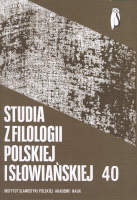Chorwacka dyskusja o statusie i nazwie języka
Croatian discussion on the status and name of the language
Author(s): Jerzy MolasSubject(s): Language studies
Published by: Instytut Slawistyki Polskiej Akademii Nauk
Summary/Abstract: The article reviews the progress of a discussion in the circles of the Croatian linguists on what the status of the Croatian language is and on the essence of the name of the language that is contemporarily used by the Croatians. The discussion started fiercely at the end of 990s, already after the disintegration of the old Yugoslavia and the Serbo-Croatian language and results from a clash of varying views and opinions on the extent of the language community that presently uses the language. In the concise form, the article presents the points made by both proponents and opponents of the language unity of the Croats, the Bosnians, the Serbs and the Montenegros. The quoted points made in the discussions refer to the linguistic, socio-political and legal arguments adopted when the languages are differentiated as and when those languages emerged as separate entities. The linguistic criteria involve such elements like the grammatical structure and composition of the lexicon of particular idioms, their genesis, dialectal base and the scope of inter- and mutual-comprehensibility of the texts in the Serbian, Croatian, Bosnian and Montenegroan languages. The criteria of the socio-political character refer to the symbolic function of the language in the process of building the structure of national identity of each and every national community. Further, factors of the legislating nature regulating the languages were also taken into consideration, especially as for the right of every nation and ethnic group to protect and develop its own language. In addition to that, the text of the article presents the problems and solutions in the domain of terminology that were adopted by the Croatians after the mid 960s, the ones that were aimed at liminating the usage of the phrase: “the Serbo-Croatian language”. Those proposals were also remembered in the present discussion. In the conclusion of the article its author makes the point that the sharpness of the discussion conducted in the Croatian circles on the status and the name of their language results less from the requirement to defend the language in the international scene, but is used predominantly to reinforce the coherence of the society; that point is further supported by the quoted latest memorandum of the Croatian Academy of Sciences and Arts (dated February 2005) on the risks that the Croatian language presently faces.
Journal: Studia z Filologii Polskiej i Słowiańskiej
- Issue Year: 2005
- Issue No: 40
- Page Range: 463-481
- Page Count: 18
- Language: Polish

